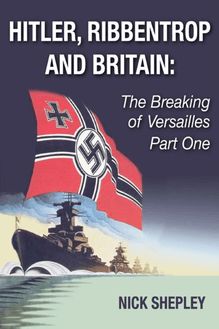-
 Univers
Univers
-
 Ebooks
Ebooks
-
 Livres audio
Livres audio
-
 Presse
Presse
-
 Podcasts
Podcasts
-
 BD
BD
-
 Documents
Documents
-
- Cours
- Révisions
- Ressources pédagogiques
- Sciences de l’éducation
- Manuels scolaires
- Langues
- Travaux de classe
- Annales de BEP
- Etudes supérieures
- Maternelle et primaire
- Fiches de lecture
- Orientation scolaire
- Méthodologie
- Corrigés de devoir
- Annales d’examens et concours
- Annales du bac
- Annales du brevet
- Rapports de stage
La lecture à portée de main
Vous pourrez modifier la taille du texte de cet ouvrage
Découvre YouScribe en t'inscrivant gratuitement
Je m'inscrisDécouvre YouScribe en t'inscrivant gratuitement
Je m'inscrisEn savoir plus
Vous pourrez modifier la taille du texte de cet ouvrage
En savoir plus

Description
Informations
| Publié par | Andrews UK |
| Date de parution | 07 décembre 2015 |
| Nombre de lectures | 0 |
| EAN13 | 9781785382390 |
| Langue | English |
Informations légales : prix de location à la page 0,0150€. Cette information est donnée uniquement à titre indicatif conformément à la législation en vigueur.
Extrait
Title Page
EXPLAINING INTERNATIONAL RELATIONS 1870-1914
Your Guide To The Ten Toughest Exam Questions On The Causes Of World War One
Nick Shepley
Publisher Information
Published in 2015 by
Andrews UK Limited
www.andrewsuk.com
The right of Nick Shepley to be identified as the Author of this Work has been asserted by him in accordance with the Copyright, Designs and Patents Act 1998
Copyright © 2015 Nick Shepley
All rights reserved. No part of this publication may be reproduced, stored in a retrieval system, or transmitted, in any form or by any means without the prior written permission of the publisher, nor be otherwise circulated in any form of binding or cover other than that in which it is published and without a similar condition being imposed on the subsequent purchaser. Any person who does so may be liable to criminal prosecution and civil claims for damages.
Introduction
There are few topics that have generated more controversy between historians than the causes of the First World War. The conflict that began in the late summer of 1914 was expected by all sides to be over quickly and the nature and ferocity of the four year conflict was almost universally unexpected. The war shaped the rest of the century and involved every power in Europe, their colonial empires and nations as far removed from the western front as Japan, Mesopotamia, Ireland and Brazil. Therefore the question as to what the long term and short term causes of the war were is still important a century later, when many of the problems that emerged from the conflict still cast a long shadow over international affairs.
This ebook addresses ten aspects of international affairs between the Franco Prussian War and the outbreak of the First World War. It features a historiographical essay at the end and a discussion on how to maximise your marks in an essay. There is also a short appendix with recommended reading and a glossary. Because this is a short introductory guide, inevitably there will be areas where readers will wish to know more.
The ebook covers the changes in diplomacy throughout the period 1870 to 1914, a period of nearly a half century in which tensions between the great powers gradually increased. There were several occasions when a European war was possible, but throughout the period, the great powers were frequently successful in drawing back from conflict. While we in the 21 st Century know that the war broke out in 1914, it is important to remember that for most of the period, the war was not inevitable or seen by the great powers of Europe as inevitable.
Each chapter in this ebook will cover an important question about the period which regularly features on UK exam papers. The ebook does not focus on one particular exam board but covers issues which are common to all of them.
Question 1
What was the significance of the Unification of Germany on European diplomacy?
In 1871 the British leader of the opposition, Benjamin Disraeli said: “There is not a diplomatic tradition which has not been swept away. You have a new world, new influences at work, new and unknown objects and dangers with which to cope...The balance of power has been entirely destroyed, and the country which suffers most, and feels the effects of this great change most, is England.”
He was referring to the unification of Germany, an event that he argued was a ‘revolution’ and one which was more significant that the French Revolution of 1789. In 1871, the German Empire was proclaimed with Kaiser Wilhelm I as the head of state and Otto Von Bismarck, the architect of unification, as its Chancellor. In order to unify Germany, Bismarck had fought three wars against Denmark (1864), Austria (1866) and France (1870). He had established Germany as the largest, most economically powerful and militarily successful nation in Europe, presenting a direct challenge to the pre-existing balance of power.
The Balance of Power
The balance of power was a diplomatic concept that had been developed following the defeat of Napoleon Bonaparte in 1815 at the Congress of Vienna . The British believed that the balance of power meant that no one state on the European continent should become excessively strong so that it could economically dominate the continent or be so militarily strong it could threaten or invade multiple rival states. France had been able to achieve this under the rule of Napoleon up to 1815 and the result had been two decades of almost continuous war from 1792 onwards.
The British, with their large empire stretching from Canada to India and Australia (later in the 1880s and 1890s encompassing Africa), saw European countries as the chief markets for their manufactured goods and the raw materials that flowed from their imperial possessions. One dominating state such as France or Germany on the continent would disrupt British trade and become a natural rival. Britain was an island with a large navy and an overseas empire and the dominant global power for much of the 19 th Century, the rise of Germany threatened that dominance. However, for most of the period between 1871 to the end of the century, Anglo German relations were surprisingly good, British politicians, diplomats and the general public and popular press were far more hostile towards Russia and France.
Germany and Her Neighbours
The rise of Germany as a great power had a far more direct effect on France, she was defeated by Prussia during the Franco-Prussian War of 1870 which resulted in humiliation for France and the unification of Prussia with the other German states to create the German Empire. The French emperor, Napoleon III abdicated and fled and the French capital, Paris, rose in revolution. France’s role as the dominant continental power was lost and instead the title went to her far larger, more populous and economically powerful neighbour, Germany. France became diplomatically isolated in Europe as Bismarck (see chapter seven) formed alliances with Europe’s other great powers, Austria and Russia.
The Dreikaiserbund (the league of three emperors), was created in 1873 in order to prevent France from forming close friendships with either of Germany’s potential great power rivals, Russia and Austria-Hungary. Bismarck knew that the British were not interested in becoming drawn into continental alliances and had no love for the French, so the Dreikaiserbund kept France without alliances. He encouraged the French instead of seeking back their lost territories of Alsace and Lorraine (annexed by Germany), to build empires in Africa and Asia in order to take the sting out of wounded national pride. Bismarck knew that Germany had been lucky to win three wars in a row and believed that fighting France or another great power would be foolhardy, as it would only take one defeat to destroy Germany. He was also keen to make sure that Germany was not surrounded by enemies, because she was a nation in central Europe that was always at risk of being attacked on both sides. Bismarck feared the possibility of a war against Germany on two fronts and was convinced that it was the kind of war that it would be impossible for Germany to win. For this reason he was wary about building an overseas empire for Germany, similar to that of the British, French or Belgians, believing that imperial disputes could lead to war in Europe.
A Strained Alliance
Germany’s two main allies, Russia and Austria, both had conflicting interests in the Balkans (see Chapter Five) and Bismarck realised that he would have to choose one of the two powers and could not back both of them. In 1878, following a dispute between Russia on one side and Austria and Britain on the other over the former’s plans to create extend their influence into the Balkans, Bismarck called a congress of the great powers in Berlin. At the congress he backed Austria and Britain over Russia’s claims, an act that gradually saw Russia become more and more alienated from Bismarck’s system of alliances.
The overall impact on European diplomacy of the unification of Germany was to create tensions and anxieties in the other major continental powers that could not be reconciled. Bismarck’s diplomacy worked at containing these tensions throughout the 19 years he was in office (1871-1890), but even before he resigned as Chancellor, his system of treaties and alliances was unravelling.
Question 2
What were Britain’ s main objectives between 1870 and 1904?
The British, by the middle of the 19 th Century, had the largest empire the world had ever seen, it was the key to Britain’s wealth and had been accumulated largely through Britain’s trading activities. The most valuable part of her empire was India (a territory that incorporated modern day Pakistan, India, Bangladesh and Burma), which served as a vast captive market for British goods and a source of cheap raw materials such as cotton and opium. The British were anxious to prevent any threat to India, in the 18 th Century they had fought several wars not only against various regional Indian rulers but also against France to prevent her from having any control over the subcontinent. In 1857 a violent and bloody uprising by native Hindu and Muslim soldiers who fought for the East India Trading Company (the private company that represented Britain in India and ruled in the Queen’s name), resulted in direct control over India from London once the uprising had been crushed. India was referred to by British Imperialists as the ‘Jewel in the Crown’ of empire and as such, protecting it from rival powers or nationalist uprisings was Britain’s number one priority.
Threat From Russia
By the 1850s the British had grown increasingly suspicious of the former ally Russia. The growth in power of Russia throughout the f
-
 Univers
Univers
-
 Ebooks
Ebooks
-
 Livres audio
Livres audio
-
 Presse
Presse
-
 Podcasts
Podcasts
-
 BD
BD
-
 Documents
Documents
-
Jeunesse
-
Littérature
-
Ressources professionnelles
-
Santé et bien-être
-
Savoirs
-
Education
-
Loisirs et hobbies
-
Art, musique et cinéma
-
Actualité et débat de société
-
Jeunesse
-
Littérature
-
Ressources professionnelles
-
Santé et bien-être
-
Savoirs
-
Education
-
Loisirs et hobbies
-
Art, musique et cinéma
-
Actualité et débat de société
-
Actualités
-
Lifestyle
-
Presse jeunesse
-
Presse professionnelle
-
Pratique
-
Presse sportive
-
Presse internationale
-
Culture & Médias
-
Action et Aventures
-
Science-fiction et Fantasy
-
Société
-
Jeunesse
-
Littérature
-
Ressources professionnelles
-
Santé et bien-être
-
Savoirs
-
Education
-
Loisirs et hobbies
-
Art, musique et cinéma
-
Actualité et débat de société
- Cours
- Révisions
- Ressources pédagogiques
- Sciences de l’éducation
- Manuels scolaires
- Langues
- Travaux de classe
- Annales de BEP
- Etudes supérieures
- Maternelle et primaire
- Fiches de lecture
- Orientation scolaire
- Méthodologie
- Corrigés de devoir
- Annales d’examens et concours
- Annales du bac
- Annales du brevet
- Rapports de stage




















